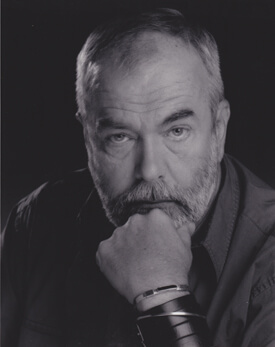Arch Brown died this month at his Palm Springs home. | COURTESY: JAMES WALLER
Arch Brown, a supporter of the arts and writer who was of that generation of gay playwrights who first told the community’s authentic stories on Off Broadway stages, died of natural causes on September 3 in his Palm Springs home. He was 76.
“He had a tremendous love of theater, and he had tremendous love of gay-themed theater and literature,” said Jameson Currier, an author who is a longtime member of the Arch and Bruce Brown Foundation board. “It was important to him to pass it along.”
Brown published 15 plays and three books. His first and best-known work was “News Boy,” a 1979 one-set show that played Off Broadway. In a 1980 review, the Washington Post called “News Boy” a “wickedly witty, mod comedy of manners that turns its satirical eye on the gay subculture and its life styles.” The newspaper described Brown as “a lesser Neil Simon who has come out of the closet.”
Brown was a peer of Doric Wilson, Robert Chesley, Jane Chambers, and other playwrights who brought honest stories of gay and lesbian life to the stage.
“They were engaged in a common enterprise,” said James Waller, Brown’s literary executor and longtime friend. “His first play was the most successful of any of his plays. He was part of that first generation of gay and lesbian playwrights.”
The importance of Brown’s barrier-breaking work was reflected in the Post’s review. While the play was praised, the reviewer showed the struggle mainstream culture then had with gay content, when she wrote that the play “deals frankly, and sometimes perceptively, with the homosexual experience without voyeurism. The language is raucous and, at times, ribald. On the stage, men embrace and talk about male lovers. But once the context is accepted, these scenes fall naturally into the plot.”
Born Arnold Krueger in 1936 and raised in Chicago, Brown moved to New York City in the ‘50s. He had a successful career making gay porn. He directed 18 films, and in a 1972 article, Variety said Brown was “among the most technically polished New York-based gay filmmakers.”
In 1971, police seized four films, including Brown’s “Tuesday,” at the First Annual New York Erotic Film Festival, according to Variety. At trial, the obscenity charges against Brown’s film were upheld, while charges against the three straight films were dismissed. The festival organizer had to pay a $250 fine.
Brown’s film was “a nicely-photographed hardcore sex pic different from the cleared pix only in superior technical quality and fact that the encounter is between two males. That, apparently, was enough to make it obscene for Judge Pincus, who would not accept attorney Martin Garbis’ argument that pic offered ‘new information’ for straight audiences,” Variety wrote in its usual staccato-style prose. The attorney was Martin Garbus, the noted First Amendment lawyer.
While he called Arch Brown his “nom de porn,“ Waller said, he used the name for all of his work. Arch was the name Brown used when cruising for sex, and Brown was the family name of Bruce Brown, his partner of 28 years. The two met in 1965 and were together until Bruce’s death in 1993. The foundation was established in Bruce’s honor.
The foundation, which has given away tens if not hundreds of thousands of dollars, supports writers and productions, requiring that funded projects be gay-themed and have an historic element.
“I think historic because there was a sense that contemporary problems and issues and sensibilities had roots in the historic past and it was important to acknowledge that,” said Donna R. Barnes, a foundation board member and Brown’s longtime friend. “He also thought that reaching to find the historic past… set some creative challenges for the writers, and why gay-positive is obvious.”
The foundation held an annual writing competition. Currier was a grant recipient in 1997.
“It was such an important element of my continuing to be a writer,” Currier said. “It was a stamp of validation, a stamp of approval. It came at a very important moment, and I never forgot it.”
Arch will be buried next to Bruce at the Brown family plot in Charlotte, Michigan. In accordance with Brown’s wishes, there will be no public memorial or service, but there will be “a gathering later this fall of board members and friends… The kind of thing that he would have enjoyed coming to,” Barnes said.
“He was a man with enormous interests and humor,” she said. “He had a sparkling twinkle about him…He was funny, he was witty.”





































